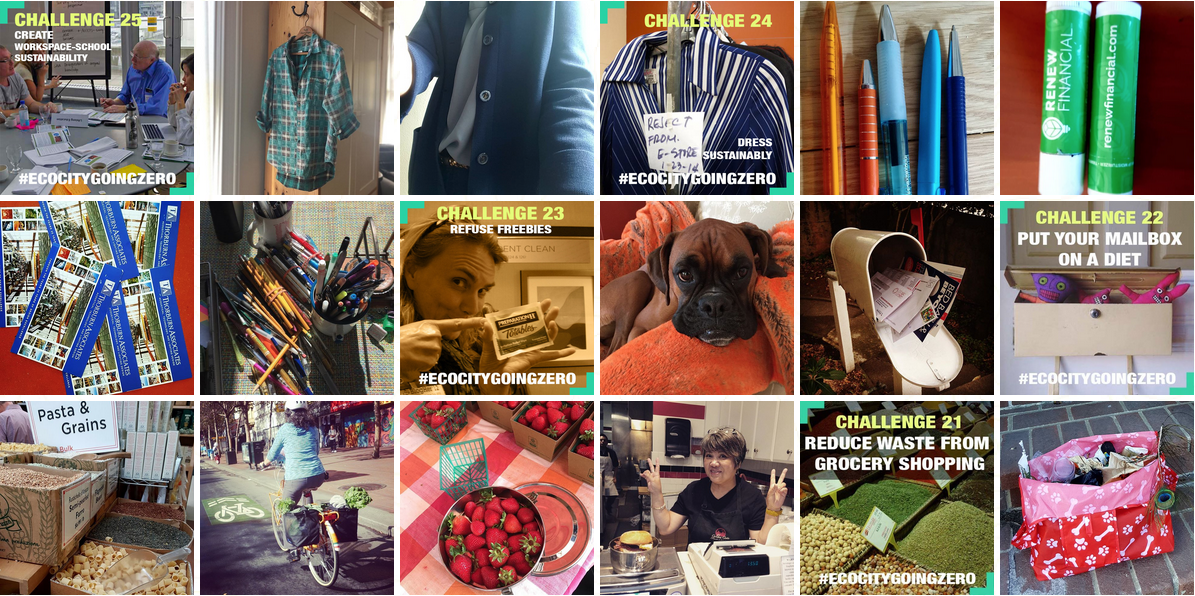
31 Jul #EcocityGoingZero: 30 challenges, over 150 posts, inspiring discussions, and countless lessons learned
As the Ecocity 30 Day Zero Waste Challenge has come to a close with the final challenge to Power down (we weren’t online on July 30!), it’s time to take a look back at 30 days of connecting the threads of our personal actions to broader ecocity ideals. If there’s one overarching lesson we learned it’s that a campaign that goes on for an entire month and is open to anyone and everyone will give you so much more — and unexpected — insight than you could ever have hoped for. It will bring people to the table you never expected, through channels unforeseen, in ways that surprise and delight.
It started with our kickoff event at the Oakland Impact Hub where a bunch of amazing people set the inspiring tone for Ecocities in Action. From Maricelle Cardenas of StopWaste.Org educating us on how to Stop Food Waste, Debra Baida of Liberated Spaces bringing consciousness to the materials flowing through our homes, Gary Barker of Ditto Sustainable Brand-Solutions shining light on the textile industry’s dirty little secret (20 billion plastic hangers going into landfills every year!) and Ecocity Builders ED Kirstin Miller connecting our personal actions to ecocitizenship, this was a great example of how local direct engagement and collaboration can plant seeds and send ripples towards lightening our collective footprint.
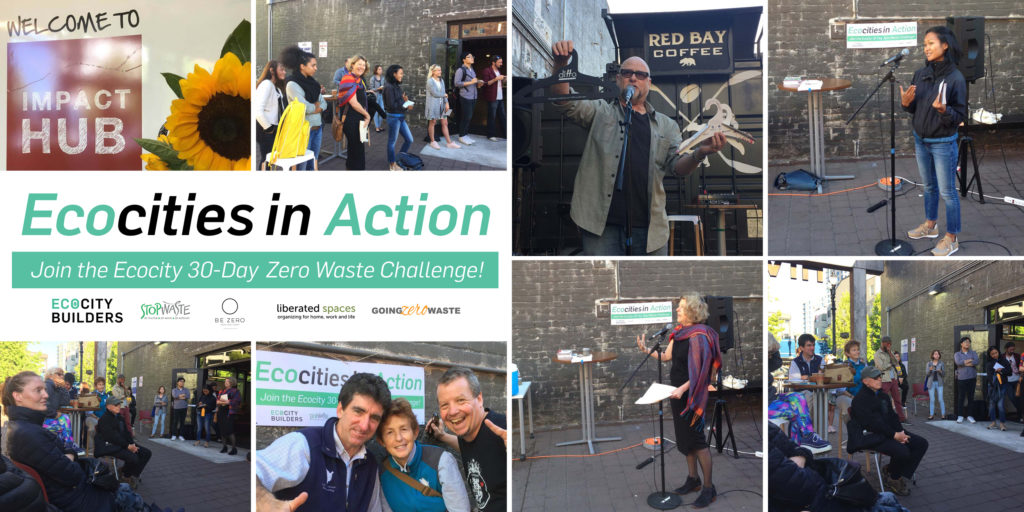
During Week 1 we tackled some of the most basic but pressing challenges dealing with one of the greatest waste issues of our time: plastic pollution. From saying no to plastic straws to bringing reusable water bottles, mugs, and food containers, these initial challenges not only set the tone with lots of “mug shots” on Instagram but some unexpected engagement on our personal Facebook walls.
“Something that happened: I went to my usual café for an iced strawberry hibiscus tea (YUM) and said out loud, “No straw”. And he said, “They’re over there.” And I said, “No, I’m saying no straw out loud to remind myself not to use one. Plastic waste.” Barista said, “Oh yeah, that’s a good idea.” Sez me: “Why not have real straw straws?” Sez he: “Actually we want to experiment with paper ones.” I sez, “Do it. I will buy more tea.” We smiled. Technique for spreading eco-challenge invented.”
– Dorothy, Hillsborough / North Carolina
“So cool! I haven’t signed up and I don’t use Instagram (yet), but so far my family is right there with you. No disposable straws, our own water bottle, and I always bring my travel mug to the coffee shops where I regularly go to write. I dream of us becoming more like the old Tibetans, who brought their one wooden bowl everywhere they went, no matter how fancy or elegant the place. They used their bowl for tea or food or alms, basically for everything.”
– Magali, Santa Cruz / California
Week 2 brought us zero waste basics like Eliminating single-use plastic bags and Becoming a better recycler but it also delved into deeper arenas of personal habits and behaviors such as Declutter and Have a money-free day. Some of the alternatives to single use plastic packaging we learned about from our participants were shampoo bars, soap nuts for laundry, and a very clever waste-free snack solution.
Speaking of laundry, one of the most amazing discussion threads happened when Ecocity Builders Executive Director Kirstin Miller, who had been religiously doing each challenge up until then, decided to skip the Air-dry your laundry challenge and go for a hike instead. Her post sparked the kind of unexpected and creative discussion we were hoping for when we came up with the campaign.
Week 3 brought two food waste challenges contributed by our partners at StopWaste.org as well as two challenges that are part of our DNA at Ecocity Builders — Walk, bike, or take public transit and Each one teach one. The latter in particular brought out some exchanges that highlighted how powerful just talking about these challenges and spreading the word with friends, family, and even random strangers can be.
#EcocityGoingZero challenge co-creator Debra Baida reported the “eco-dorm” idea that had come out of a conversation with her friend’s college-bound daughter. This exchange has since led to the creation of An Economical & Eco-friendly Packing List of Things You’ll Probably Need in Your Dorm Room document that includes everything from shampoo bars, vinegar and soap nuts for simple and sustainable college cleaning needs to good quality headphones because they will “last longer and are better for your ears than ear buds.”
Ecocity Builders Communications Director Sven Eberlein shared an encounter with a clerk at the local butcher shop whose enthusiastic approval of the reusable container Sven brought for a sandwich that is ordinarily sold in non-recyclable wraps was outmatched only by her disappointment the following week when he didn’t bring his container and she had to give out the wasteful wrap again. Moral of the story: all it takes is one act of “unnormal” behavior to create a new normal. Zero waste with zero lecturing, fingerwagging, guilt-tripping, or bellyaching.
In our final week, things got resourceful and communal, with challenges ranging from Repair something and Do it yourself (DIY) to Share (or borrow) something and Create workplace/school sustainability.
The latter showed us both the incredible potential the exchanges and actions a campaign such as this one can bring, as well as the, well… challenges. For example, Kirstin used the challenge to put out the word that greening our own office can be harder than it appears, as our landlord is not exactly itching to get us a green bin for our food scraps. Getting this kind of process going on a more systemic challenge is reflective of the reality most of us deal with when trying to enact change and perhaps even more impactful in the long run than completing a single task. It made us think that another approach to this campaign might be to pick just one challenge and sustain it for 30 days.
And who knows, this could be exactly the approach that the Green Team at Piedmont Middle School will take as they embark on their own version of the Ecocity Zero Waste Challenge, led by their teacher John White who found himself inspired by the campaign.
There’s something to be said about ripples and sparks when it comes to changing our wasteful ways. But as much as we loved all the random moments of brilliant inspiration, we’d be remiss to point out that as systemic and ingrained the problems of overconsumptions are, as essential to its solution are virtues such as commitment and determination. And in that department, we’d like to acknowledge #EcocityGoingZero participant Daniela Yew, who stuck with the challenges from beginning to end, offering us insights into the daily flow of a zero waste lifestyle, with moments of wit, common sense, and rejoicing in the small daily acts.
While the 30 days have come to pass and we’ve arrived at the end of the challenge, what we’ve realized is that this is just the beginning. As an organization that is 100% committed to reshaping our urban environments through participatory people power we’ve been heartened by the many lightbulbs that have been set off by this process, as well as made hungry for more. While this initial experiment to gauge interest and gather information contained a relatively small sampling size, we think that this run has given us so much more than just numbers. We’ve come away feeling that both expanded as well as more focused Ecocity Zero Waste Challenges could yield not only valuable citizen-generated insights and data on a city and neighborhood scale in regards to material flows and the human behaviors driving them, but set in motion the kinds of inspirational ripples that drive people-powered change from the bottom up.
So stay tuned for the next iterations of #EcocityGoingZero. Or better yet, become a driver of ecocitizenship by letting us know in the comments how and where we should challenge ourselves and each other next.
If you’d like to stay updated on future iterations of this campaign or you have friends, family or colleagues who might like to get involved, make sure to get on our sign-up list to receive notifications about further developments.


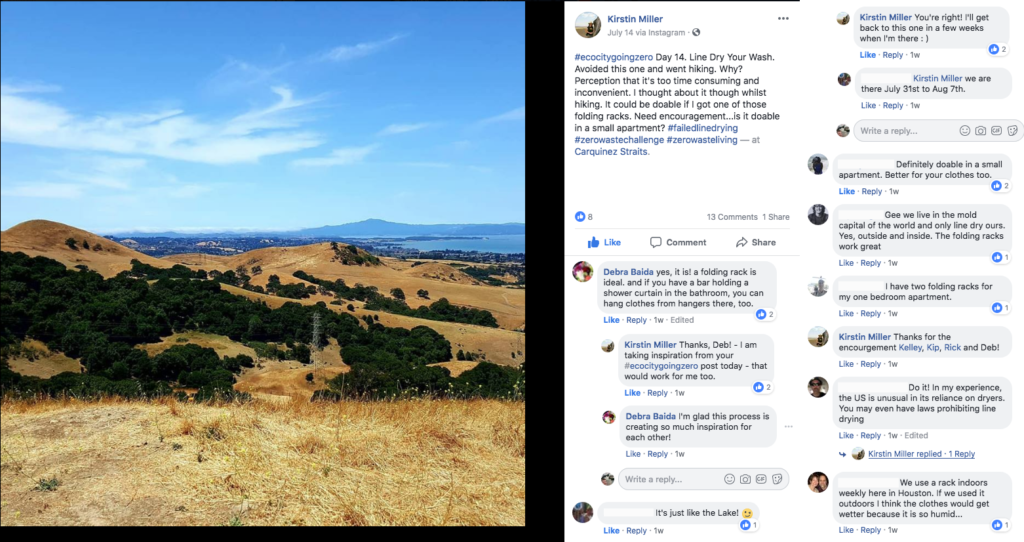
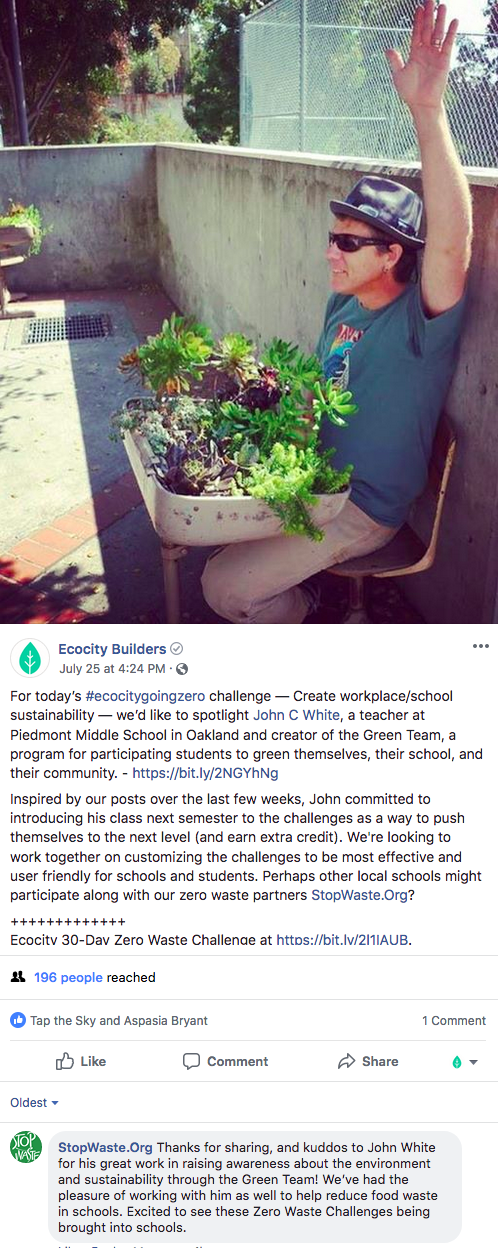
Kirstin Miller
Posted at 10:05h, 14 AugustGreat article Sven! I finally had a chance to read it through. Looking forward to continuing to evolve this with you and other emerging eco-citizens.
Lila Taheraly
Posted at 12:00h, 23 AugustFor the kitchen that does not allow food waste/compost bin.
>> If there is a frozen compartment in the fridge, here is a solution:
Have a plastic bucket or paper bag in the freezer, and have people gather their food waste in it. When full like once a week or so), bring it to a compost bin at home or anywhere else.
I have been doing that for years in my apartment building in HI. Frozen food waste, dont smell, stay clean and are easy to transport to a compost bin.